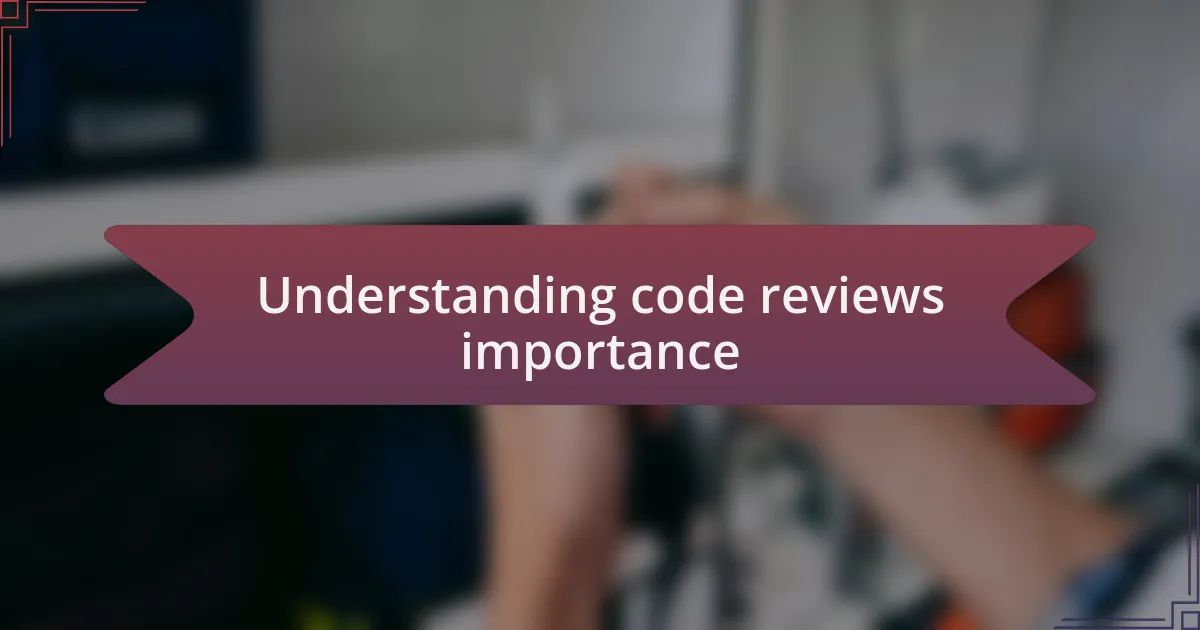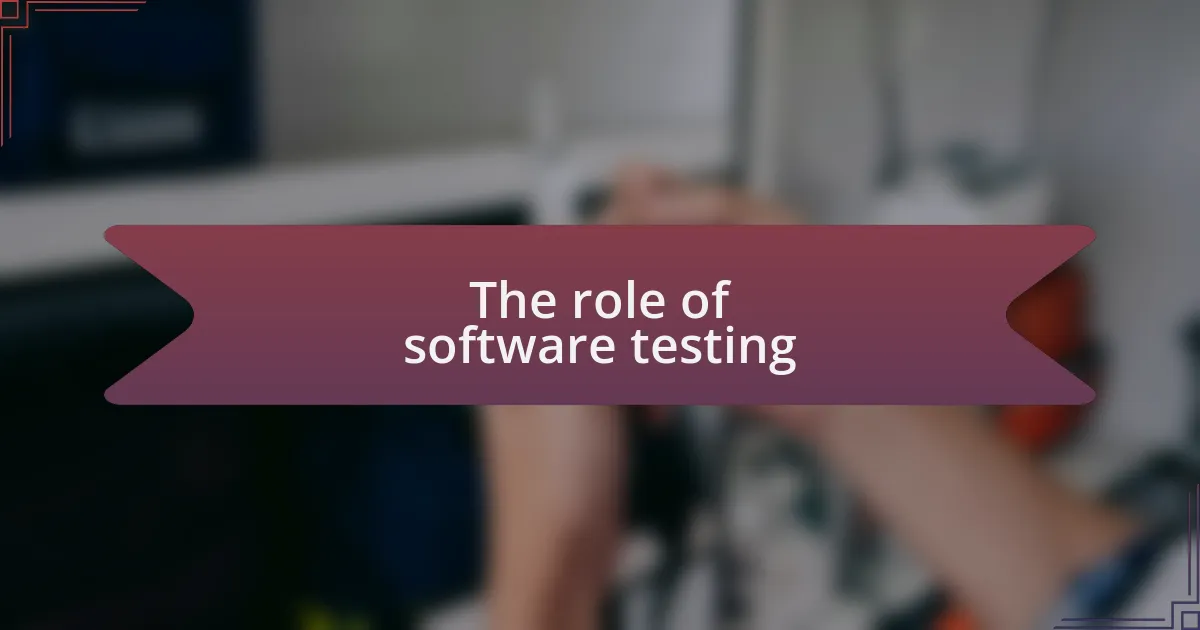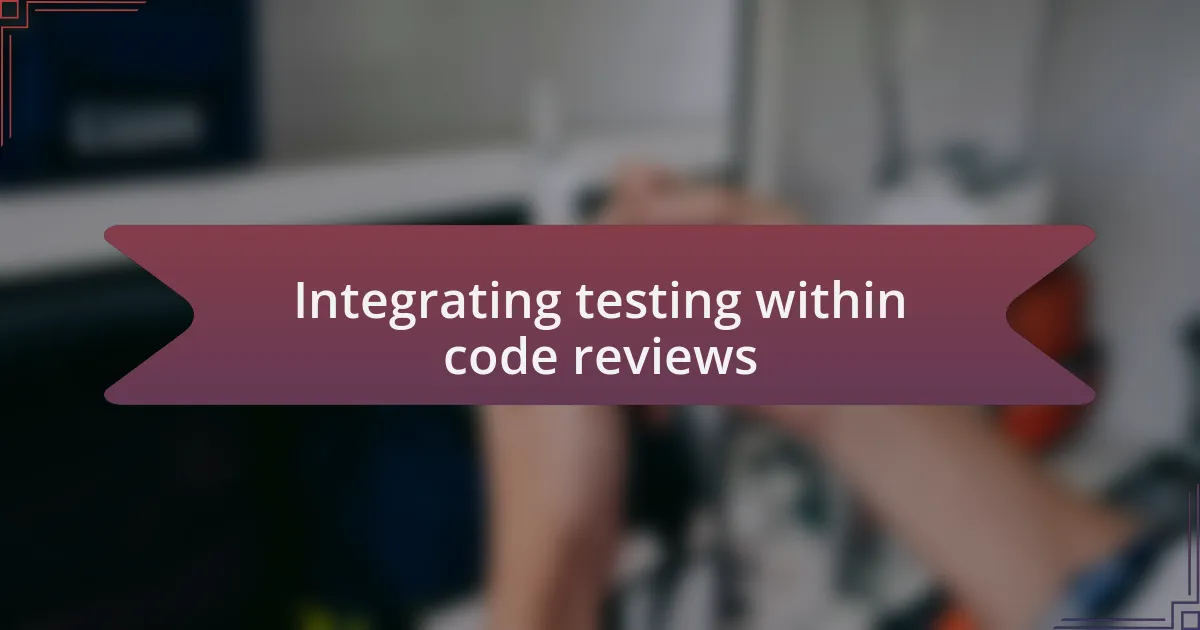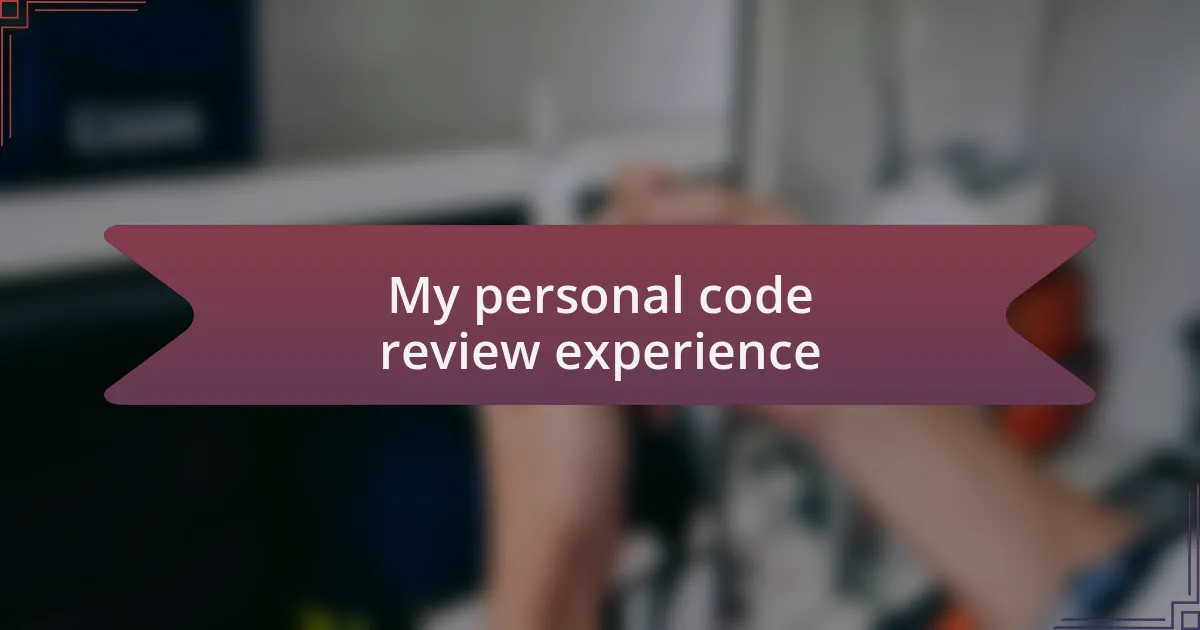Key takeaways:
- Code reviews enhance code quality and team collaboration by providing fresh perspectives and opportunities for knowledge sharing.
- Integrating testing discussions into code reviews promotes a proactive mindset and cultivates a culture of accountability among developers.
- Vulnerability during code reviews can lead to personal growth and richer discussions, transforming challenges into collaborative learning experiences.
- Clear communication and adherence to best practices are crucial for improving understanding and overall team output during the review process.

Understanding code reviews importance
When I first began participating in code reviews, I didn’t fully grasp their significance. Looking back, I realize they are essential for not just identifying bugs but also enhancing code quality and team collaboration. It’s amazing how a simple suggestion from a teammate can drastically improve a feature, right?
One time, I received feedback about a function I thought was flawless, only to discover it lacked scalability. This eye-opening moment made me realize that fresh perspectives often unveil issues I might overlook. It’s in these collaborative spaces that growth happens—not just for the code, but for me as a developer.
Understanding the importance of code reviews also means recognizing their role in knowledge sharing. We all have unique experiences and skills, and code reviews are a golden opportunity to learn from one another. Isn’t it rewarding to build a more robust codebase while simultaneously honing our own skills through shared insights?

The role of software testing
The role of software testing is multi-faceted and critical for delivering high-quality products. In my experience, testing is not just about finding errors; it’s an essential part of verifying that software meets user needs and expectations. I recall a project where thorough testing revealed discrepancies between client requirements and what was being developed, saving us from costly revisions later on.
One of the most rewarding aspects of software testing is the sense of security it provides. When I test a feature thoroughly, I often feel a wave of relief knowing that I’ve done my part to ensure a smooth user experience. Have you ever experienced that moment when you realize your testing efforts have led to a bug-free launch? It’s a huge confidence boost for both the team and the end-users.
Moreover, testing fosters a culture of accountability. I’ve seen firsthand how it encourages developers to think not only about their code but also about how it interacts within the larger system. It’s like a safety net that challenges us to take ownership of our work. When we integrate testing into our processes, we naturally cultivate a shared responsibility for quality that elevates the entire team.

Integrating testing within code reviews
Integrating testing within code reviews has proven to be a game-changer in my development workflow. I remember a specific instance when a colleague highlighted potential edge cases for a feature during a code review. By addressing those scenarios before the code was merged, we not only enhanced the functionality but also significantly reduced post-launch troubleshooting. It’s moments like these that make me realize how crucial it is to weave testing into our review discussions.
In my experience, engaging in conversations about testing during code reviews promotes a proactive mindset. It got me thinking: how often do we stop to consider the implications of our code? When we take the time to discuss testing strategies with our peers, we encourage a deeper understanding of both the code and its potential pitfalls. This collaborative approach has not only improved my own coding practices but has also fostered a shared commitment to quality across our team.
Furthermore, I’ve found that integrating testing discussions into code reviews cultivates trust. Knowing that other team members are invested in evaluating the reliability of our work allows for a more open dialogue about problem-solving. It’s not just about highlighting issues; it’s about building a supportive environment where we can all learn from each other’s experiences. Isn’t it reassuring to think that we can create a culture where we collaboratively strive for better outcomes?

My personal code review experience
Reflecting on my past experiences with code reviews, I remember a particular review session where one of my junior developers pointed out a flaw in my logic. At first, I felt defensive, but then I realized this was a fantastic opportunity for growth. That moment taught me that vulnerability during reviews can lead to richer discussions and, ultimately, better software.
There was a time when I overlooked the importance of testing my code sufficiently, and it resulted in a significant bug making it to production. The embarrassment was tough to swallow, but it became a defining moment in my career. That incident sparked my commitment to not just my code but also to the collective responsibility of ensuring quality through code reviews, turning a painful experience into a powerful lesson.
I’ve also found that the camaraderie built during these reviews is invaluable. When I face challenges, discussing them with teammates who genuinely care about the success of the project gives me confidence. Isn’t it amazing how sharing our insights and stories can transform what could be a solitary task into a collaborative journey?

Lessons learned from code reviews
Code reviews have revealed to me the importance of clarity in communication. Early in my career, I submitted code with comments that I thought were clear, but feedback indicated otherwise. I learned that explaining my thought process explicitly helped not only the reviewers but also me, reinforcing the idea that clear communication can enhance understanding and collaboration.
One of my most enlightening experiences happened when a colleague highlighted a recurring pattern in my coding style that did not adhere to our team’s best practices. Instead of feeling criticized, I embraced this feedback and spent time learning about the principles behind those best practices. This experience taught me how much I could grow by adapting my code to align with collective standards, which ultimately improved our entire team’s output.
I often reflect on the moments during reviews when a simple question prompted a deeper dive into complex logic. For instance, when someone asked, “What happens here if…?” I had to pause and reassess my assumptions. Those instances remind me that approaching code with curiosity fosters a culture of open dialogue. Isn’t it refreshing how a genuine question can lead to richer solutions? Each review reinforces the idea that we are all learning together, continuously refining not just our skills but also our mindset.